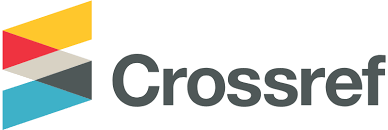Problem-Based Learning on the Abilities of Writing Argumentation Communications of Malay-Indonesia Department Students
a Study at Hankuk University of Foreign Studies South Korea
Abstract
The aim of this research is to determine the effect of the problem-based learning model on the ability to write argumentative essays of Malay-Indonesian study program students in the 4th semester audio visual course. In this research, this research used a quasi-experimental method by conducting a pre-test and post-test in two groups. This type of experimental research method uses a nonequivalent control group design, where the experimental class is treated and the control class is not treated. This nonequivalent control group design is almost the same as the pretest and posttest control group design, only in this design the experimental and control groups are not chosen randomly. Data collection techniques use tests. Data analysis techniques start from the normality test, homogeneity test, and continue with hypothesis testing.research data,So that post-test or final test data was obtained which was then analyzed using a two-sided T test, giving results that students who were given problem-based learning model learning treatment experienced more improvement compared to students who were not given problem-based learning strategies. This means that it is in accordance with the proposed hypothesis and it can be concluded that there is a difference in the ability to write argumentative essays between students who are given a problem-based learning model and students who are not given a problem-based learning model.
References
penggunaan media audio visual pada pembelajaran Menulis Teks Deskripsi. Silampari Bisa: Jurnal Penelitian Pendidikan Bahasa Indonesia, Daerah, Dan Asing, 3(2), 356-370.
Amarullah, A., & Enawar, E. (2021). The Effect Group Investigation Method On
Language Learning Outcomes. English Review: Journal of English Education, 10(1), 337-348.
Dalman, H. (2014). Keterampilan Menulis. Jakarta: PT Raja Grafind Persada.
Goziyah, G., Ariyana, A., Kamiri, K., Purawinangun, I. A., Sulaeman, A., & Saputra, N.
(2022). Developing Cross Cultural Understanding-Based Indonesia Language
Material For South Korea Foreign Speakers. English Review: Journal of English
Education, 10(3), 865-874.
Hamdayama, Jumanta. (2014). Model dan Metode Pembelajaran Kreatif dan
Berkarakter. Jakarta: Ghalia Indonesia.
Ishak, S. (2014). Cara Menulis Mudah. Jakarta: PT Elex Media Komputindo.
Rusman. (2012). Model-Model Pembelajaran. Jakarta: PT Raja Grafindo Persada.
Saddhono, K. S., Susanto, G., & Muzaki, H. (2024). Developing BIPA Teaching
Materials Containing East Java Culture, Indonesia.
Research Journal in Advanced Humanities, 5(1).
Safi'i, I., Rufaidah, I., Anggara, U. E., & Sobri, S. (2021). Instrumen Evaluasi Teks Berita
Dalam Buku Teks BSE Bahasa Indonesia. MENDIDIK: Jurnal Kajian
Pendidikan dan Pengajaran, 7(2), 143-150.
Sulaeman, A. and Goziyah. (2019). Metodologi Penelitian Pendidikan Bahasa dan Sastra. Edu Pustaka; Jakarta.
Sulaeman, A., Hun, K. Y., & Ferdianda, A. (2021). Ecocritics In Song Lyrics Collection By Barasuara And Its Implication Towards The Indonesian Language Learning Material In Senior High School (Kumpulan Lirik Lagu Barasuara Band Karya Iga Dada Yudhistira Massardi Dan Implikasi Dengan Materi Pembelajaran Bahasa Indonesia Di Sekolah Menengah Atas Kajian Ekokrtik Sastra). Jurnal Gramatika: Jurnal Penelitian Pendidikan Bahasa dan Sastra Indonesia, 7(1), 103-116.
Sulaeman. A., Sori, S. and Enawar. (2021). Skimming Reading Techniques On The
Ability To Identify Intrinsic Drama Text Elements. Volume 6, Issue 1, March 2021 https://journal.stibaiec-jakarta.ac.id/ojs/index.php/jell/issue/view/10
Sulaeman, A., & Dwihudhana, W. (2019). Hubungan motivasi belajar dengan hasil
pembelajaran bahasa Indonesia bagi penutur asing (BIPA) pada mahasiswa semester 7 program studi pendidikan bahasa dan sastra indonesia FKIP Universitas Muhammadiyah Tangerang. Silampari Bisa: Jurnal Penelitian Pendidikan Bahasa Indonesia, Daerah, dan Asing, 2(1), 59-70.
Suparno, dkk. (2012). Keterampilan Dasar Menulis.Tangerang:Universitas
Terbuka.
Sugiyono. ( 2011). Metode Penelitian Kuantitatif dan Kualitatif dan R&D.
Bandung: ALFABETA, CV.
Shoimin, A (2014). 68 Model Pembelajaran INOVATIF dalam Kurikulum
2013. Yogyakarta: AR-RUZZ MEDIA.
Tanwin, S., & Rosliani, R. (2020). The development of Indonesian language teaching
materials for beginner level of foreign speakers with local content. Budapest International Research and Critics in Linguistics and Education (BirLE) Journal, 3(3), 1600-1613.
Tarigan, H. G. (2008). Menulis Sebagai Suatu Keterampilan Berbahasa.
Bandung: Angkasa.
Trianto. (2007). Model-Model Pembelajaran Inovatif Berorientasi
Konstruktivistik. Jakarta: Prestasi Pustaka.
Yamin, M (2013). Strategi dan Metode dalam Model Pembelajaran.
Jakarta: Referensi.
Yunus, M. (2013). Keterampilan Menulis. Tangerang: Universitas Terbuka.
Wahana, R. (2019). Penerapan Model Pembelajaran Creative Problem Solving
(CPS) untuk Meningkatkan Kemampuan High Order Thinking Skills
(HOTS) dalam Pembelajaran Bahasa Indonesia pada Kompetensi Teks Deskripsi Kelas VII. In Seminar Nasional Pendidikan Bahasa dan Sastra (pp
Copyright (c) 2024 Agus Sulaeman

This work is licensed under a Creative Commons Attribution-NonCommercial-ShareAlike 4.0 International License.
Retained Rights/Terms and Conditions of Publication
1. As an author you (or your employer r institution) may do the following:
*make copies (print or electronic) of the article for your own personal
*Every accepted manuscript should be accompanied by "Copyright Transfer Agreemen" prior to the article publication.









